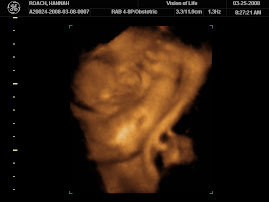I am writing this after seeing several women smoking while pregnant. Have you absolutely no regard to the life inside of you? Do you only care and think about yourself? Is it too much effort to care? I post this because I do care about your unborn son or daughter. Get a grip; smoke if you want to... it is a nasty habit, doesn’t look attractive if a man does it and even less attractive ~ more like trashy if a woman does it. Can’t you get over yourself for just 9 months at least that if you care so much about the child you are carrying?
Cigarette smoke contains more than 2,500 chemicals. It is not known for certain which of these chemicals are harmful to the developing baby, but both nicotine and carbon monoxide play a role in causing adverse pregnancy outcomes.
How can smoking harm the newborn?
Smoking nearly doubles a woman’s risk of having a low-birthweight baby. In 2004, 11.9 percent of babies born to smokers in the United States were of low birthweight (less than 5½ pounds), compared to 7.2 percent of babies of nonsmokers. Low birthweight can result from poor growth before birth, preterm delivery or a combination of both. Smoking has long been known to slow fetal growth. Smoking also increases the risk of preterm delivery (before 37 weeks of gestation). Premature and low-birthweight babies face an increased risk of serious health problems during the newborn period, chronic lifelong disabilities (such as cerebral palsy, mental retardation and learning problems), and even death. The more a pregnant woman smokes, the greater the risk to her baby. However, if a woman stops smoking even by the end of her second trimester of pregnancy, she is no more likely to have a low-birthweight baby than a woman who never smoked.
Can smoking cause pregnancy complications?
Smoking is associated with a number of pregnancy complications. Smoking cigarettes doubles a woman’s risk of developing placental problems. These include:
Placenta previa (a low-lying placenta that covers part or all of the opening of the uterus)
Placental abruption (in which the placenta peels away, partially or almost completely, from the uterine wall before delivery). Both can result in heavy bleeding during delivery that can endanger mother and baby, although cesarean delivery can prevent most deaths. Smoking in pregnancy increases a woman’s risk of premature rupture of the membranes (PROM), when the sac that holds the baby inside the uterus breaks before completion of 37 weeks of pregnancy. (Usually, when it breaks, normal labor ensues within a few hours.) If the rupture occurs before 37 weeks of pregnancy, it often results in the birth of a premature baby. '
Does smoking affect fertility?
Cigarette smoking can cause reproductive problems before a woman even becomes pregnant. Studies show that women who smoke may have more trouble conceiving than nonsmokers. Studies suggest that fertility returns to normal after a woman stops smoking.
Does smoking during pregnancy cause other problems in babies or young children?
A 2003 study suggests that babies of mothers who smoke during pregnancy undergo withdrawal-like symptoms similar to those seen in babies of mothers who use some illicit drugs. For example, babies of smokers appear to be more jittery and difficult to soothe than babies of nonsmokers. Babies whose mothers smoked during pregnancy are up to three times as likely to die from sudden infant death syndrome (SIDS) as babies of nonsmokers.
Can exposure to secondhand smoke during pregnancy harm the baby?
Studies suggest that babies of women who are regularly exposed to secondhand smoke during pregnancy may have reduced growth and may be more likely to be born with low birthweight. Pregnant women should avoid exposure to other people’s smoke.
How can a woman stop smoking?
The March of Dimes recommends that women stop smoking before they become pregnant and do not smoke throughout pregnancy and after the baby is born. A woman’s health care provider can refer her to a smoking-cessation program or suggest other ways to help her quit. The March of Dimes supports a 5- to 15-minute, 5-step counseling approach called "The 5 A’s," which is performed by the health care provider during routine prenatal visits. This approach has been shown to improve smoking cessation rates among pregnant women by at least 30 percent.
Studies suggest that certain factors make it more likely that a woman will be successful in her efforts to quit smoking during pregnancy. These include:
Attempting to quit in the past
Having a partner who doesn’t smoke
Getting support from family or other important people in her life
Understanding the harmful effects of smoking
How does exposure to smoke after birth affect a baby?
It is important to stay smoke-free after the baby is born. Parents should refrain from smoking in the home and should ask visitors to do the same. Babies who are exposed to smoke suffer from more lower-respiratory illnesses (such as bronchitis and pneumonia) and ear infections than do other babies. Babies who are exposed to their parents’ smoke after birth also may face an increased risk of asthma and SIDS. Smoking harms a mother’s health, too. Smokers have an increased risk of lung and other cancers, heart disease, stroke and emphysema (a potentially disabling and, sometimes, deadly lung condition). Quitting smoking makes parents healthier and better role models for their children.
Subscribe to:
Post Comments (Atom)


.jpg)
1 comment:
If you continue to smoke throughout your pregnancy, you risk harming the child in your womb. Before you became pregnant, you were only harming yourself, but now you’re responsible for the life growing inside you too. If you smoke during pregnancy, you are more likely to birth a child who is underweight. http://www.chantixhome.com/
Post a Comment